

9 CEOs Share Their Favorite Productivity Hacks. Photo Andrew Neel/Unsplash.

We all have the same number of hours in a week, but for some of us the demands on our time are greater. This is true with CEOs. A study published in Harvard Business Review found that each week CEOs work an average of 62.5 hours and attend 37 meetings. Getting the most out of their hours is critical. Help Your Team Manage Stress, Anxiety, and Burnout. Illustration by Dave Wheeler from HBR.
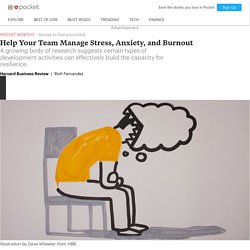
It can be tough enough to manage your own stress. But how can you, as a manager, help the members of your team handle their feelings of stress, burnout, or disengagement? Because work is getting more demanding and complex, and because many of us now work in 24/7 environments, anxiety and burnout are not uncommon. In our high-pressure workplaces, staying productive and engaged can be challenging. Although it’s unlikely that the pace or intensity of work will change much anytime soon, there’s a growing body of research that suggests certain types of development activities can effectively build the capacity for resilience.
What Great Managers Do Daily. So much depends upon managers.
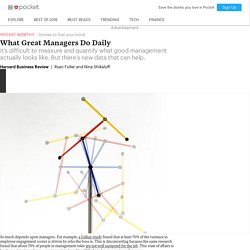
For example, a Gallup study found that at least 70% of the variance in employee engagement scores is driven by who the boss is. This is disconcerting because the same research found that about 70% of people in management roles are not well equipped for the job. This state of affairs is hurting not just employee engagement and quality of life, but also corporate performance. Most companies understand the importance of having highly effective managers, but few invest heavily in training to help them get there. One reason is that it’s difficult to measure and quantify what good management actually looks like. One Thing Steve Jobs Did at Apple That Will Instantly Improve Your Productivity.
What Great Managers Do Daily. 4 Ways to Control Your Emotions in Tense Moments - Harvard Business Review - Pocket. Twenty-three years ago, one of my employees — I’ll call him Dale — asked for a private meeting.

Dale was serious and bookish and had very strong opinions. His work was fastidious. He rarely socialized with colleagues, but he was impeccable in his commitments to others. Google Tried to Prove Managers Don't Matter. Instead, It Discovered 10 Traits of the Very Best Ones. The hypothesis was that the quality of a manager doesn't matter and that managers are at best a necessary evil, and at worst a useless layer of bureaucracy.

The early work of Project Oxygen, in 2002, included a radical experiment -- a move to a flat organization without any managers. The experiment was a disaster, lasting only a few months as the search giant found employees were left without direction and guidance on their most basic questions and needs. Never daunted, Google pivoted to extensively study the opposite question -- what are the common behaviors of their very best managers? It came up with a list of eight attributes, verified quantitatively and qualitatively in multiple ways. It then rolled out those findings in 2010 to its organization to ingest and use. The results were remarkable. So what follows are the 10 characteristics Google believes make for the best managers (and that it expects from managers), blended with my perspective on each trait. Best Jobs For Class of 2019: Highest Paid Salaries for Graduates. The Class of 2019 is getting ready to enter one hot job market.

And grads with a background in slicing and dicing data have an edge. Data scientist was the highest-paying entry-level job last year, according to Glassdoor research. Young adults in this field earned a median annual base salary of $95,000. The Stigma That Keeps Consultants from Using Flex Time. Two Things to Do After Every Meeting - Harvard Business Review - Pocket. Steve Jobs insisted that every item on a meeting agenda have a designated person responsible for that task and any follow-up work that happened.
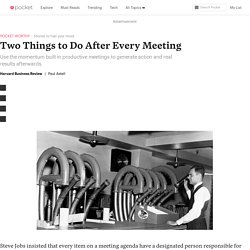
He called that person the DRI—the Directly Responsible Individual. He knew the public accountability would ensure that a project or task would actually get done, and he wanted to set clear, organized instructions for his team to follow. It sounds simple enough, and yet the majority of managers and leaders completely fail to do this. Research: Better-Managed Companies Pay Employees More Equally. Executive Summary Companies that implement more structured management practices pay their employees more equally.

That finding comes from new research that was presented at the American Economic Association meeting in January. The research is preliminary and ongoing, but the finding is striking and seemingly robust — and it surprised the researchers. How to Talk to an Employee Who Isn’t Meeting Their Goals. Executive Summary Having to tell someone that they’re not meeting their work standards can get awkward fast.
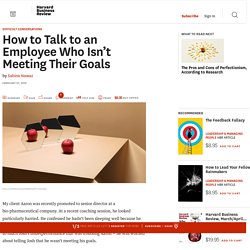
Luckily, simply asking them to evaluate themselves can do a lot of the work for you. If they can spot the problems on their own, it saves you a lot of trouble. If not, make sure that your goals and visions are aligned. How Leaders Can Open Up to Their Teams Without Oversharing. The Surprising Value of Obvious Insights. Confirming what people already believe can help organizations overcome barriers to change. MIT SMR Frontiers This article is part of an MIT SMR initiative exploring how technology is reshaping the practice of management.
Editor’s note: This is the first post in a new MIT SMR series about people analytics. To Improve Your Team, First Work on Yourself. Executive Summary If a team is not working well together, it’s highly likely that each person is contributing to the difficulty in some way.
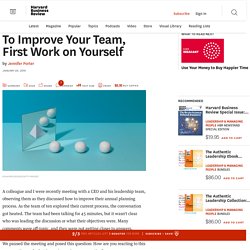
The odds of improving the team dynamic in a meaningful and sustainable will be higher if everyone — including the leader — learns to master three foundational capabilities: internal self-awareness, external self-awareness, and personal accountability. Internal self-awareness involves understanding your feelings, beliefs, and values, and how they impact your reactions. If you find yourself in an emotionally-charged situation, ask: What are my core values, and how might they be impacting my reactions? What are the facts vs. my interpretations? How to transition from managing yourself to managing others. Why Your Meetings Stink—and What to Do About It. 10 Tricks to Appear Smart During Meetings - Sarah Cooper - Pocket. Like everyone, appearing smart during meetings is my top priority. Sometimes this can be difficult if you start daydreaming about your next vacation, your next nap, or bacon. When this happens, it’s good to have some fallback tricks to fall back on.
Here are my ten favorite tricks for quickly appearing smart during meetings. 1. The Death of the Sick Day. How to Overcome Your Fear of Failure. Executive Summary People are quick to blame themselves for failure. But not doing something because you’re afraid to get started isn’t going to help you grow. Here are four strategies to help you get over the hump. Boasting about how many hours you work is a sign of failure — Quartz at Work. Talking about how many hours you work is not impressive. Far from being an indication of industrious achievements or alpha status, it should be seen as a professionally embarrassing sign that, quite frankly, you have nothing else to boast about. 3 Ways Senior Leaders Create a Toxic Culture - Harvard Business Review - Pocket. Songning Yang / EyeEm/Getty Images Photo by: Songning Yang / EyeEm/Getty Images Whether presiding over the entire company, a function, a region, or a business unit, the people at the top of an organization have a disproportionate level of influence over those they lead.
Those further down in the organization look to their leaders for cues on what’s acceptable (and what isn’t), and the team’s habits — both good and bad — will be emulated. Having your actions play out publicly, as if on a Jumbotron, is a huge responsibility, and unfortunately too many teams don’t take this responsibility as seriously as they should. The consequences can be farther reaching than most leadership teams realize. At their best, leadership teams synchronize their organizations into cohesive powerhouses.
What not to say in a salary negotiation. The Benefits of Laughing in the Office. Executive Summary Don’t be afraid to laugh out loud in the office. Here's What Hiring Managers Actually Care About. Working with a Colleague Who Feels That the World Is Against Them. Some people love to play the victim. How to manage your biggest distractions when working from home. A day in the life of an HSBC exec who wakes up at 5:30 a.m. to work out, always eats green, and studies at Stanford in her free time. Your Office Doesn’t Have Nap Time Because You Are Not a Child. Send questions about the office, money, careers and work-life balance to workfriend@nytimes.com.
Include your name and location, even if you want them withheld. Letters may be edited. If Your Employees Aren’t Speaking Up, Blame Company Culture. Executive Summary Companies benefit when employees speak up. But employees often remain silent with their opinions, concerns or ideas. Microsoft CEO Satya Nadella looks for three traits in leaders — Quartz at Work. When Satya Nadella joined Microsoft in 1992 at the age of 25, the future CEO, an engineer by training, did not yet hold a business degree.
He would complete his MBA at the University of Chicago five years later, without taking time off from his full-time job. Every Friday night, Nadella would board a plane from Seattle to Chicago, and return by Monday morning. 4 Ways to Pressure-Test Strategic Decisions, Inspired by the U.S. Military. What to Do If Your Team Is Too Busy to Take On New Work. One Reason Mergers Fail: The Two Cultures Aren’t Compatible. Executive Summary Amazon’s 2017 acquisition of Whole Foods was met with a lot of fanfare.
The deal would allow Amazon to grow beyond e-commerce and collect significant shopper data, while Whole Foods could lower its prices and scale up after its recent declines in sales. But a year later, stories of Whole Foods employees crying on the job over Amazon’s changes have begun circulating, and some workers have even taken steps to explore unionizing. 16 Mental Shifts for Living a Happier, Wealthier, More Successful Life. How this productivity coach uses 'compartmentalization' to focus and reduce stress. Why Tesla's Elon Musk asks job applicants this key interview question. Everyone Suffers from Impostor Syndrome — Here’s How to Handle It.
9 Habits of Super Successful People and What You Can Learn From Them. The annoying habits of highly effective people - Bartleby. The Key to Career Growth: Surround Yourself with People Who Will Push You. Fortune. How to Successfully Delegate Work to Someone Else. 8 questions to ask during a job interview. What to Do If There’s No Clear Career Path for You at Your Company. When to work: How to optimize your daily schedule for energy, motivation, and focus.
Stop Wasting Money on Team Building. Why Companies Should Add Class to Their Diversity Discussions. What to Do When You Have a Bad Boss. 10 Powerful Attributes of Insanely Successful People. 10 Small Habits That Have A Huge Return On Life. Capital - Why time management so often fails. How to boost your self-confidence in a job interview. The 3 Stages of Failure in Life and Work (And How to Fix Them) - James Clear - Pocket. The 10/10/10 Rule For Tough Decisions - Fast Company - Pocket. How Hiring Managers Expect You to Answer These Annoying Job Interview Questions. 19 questions you should never ask in an interview — and what you should ask instead. How to Stop Saying “Um,” “Ah,” and “You Know” Jeff Bezos' 3-question test to hire employees at Amazon. - The Washington Post. Redirect?&url= Redirect?&url= Open Offices Make You Less Open.
How Are You Protecting Your High Performers from Burnout? 5 Common Complaints About Meetings and What to Do About Them. 7 Traits of Super-Productive People. 7 things I do outside work that double my productivity. Leaders, Stop Avoiding Hard Decisions. 4 Ways to Deal With a Toxic Coworker. Understanding Speed and Velocity: Saying "NO" to the Non-Essential. What Corporate Climbers Can Teach Us - WSJ. How to Master the Art of Looking Busy. The simple habits of mentally tough people. Fighting Paranoid and Incompetent Micromanagers and Control Freaks.url. 10 Excuses Unproductive People Basically Always Use. To Work Better, Work Less. The-case-for-a-21-hour-work-week.html.url. Classic Leadership Skills You Should Apply to Your Social Life. How to Handle a Toxic Work Environment. I'm Angelo Sotira, Co-Founder of DeviantArt, and This Is How I Work. The Most Powerful Person in the Office. Who's In The Office? The American Workday In One Graph : Planet Money.
5 Fool-Proof Ways to End Procrastination Today. ADPVoice: 3 Innovative Concepts To Increase Collaboration In The Workplace. The 12 Signs: How to know when you’re slowly but surely becoming a bad manager. From Steve Jobs to Oprah: 28 Leaders' Commencement Speeches That Will Make You Re-Think Success. How to stay focused and productive without getting burnt out. Ten Smart Interview Questions. Create a Growth Culture, Not a Performance-Obsessed One.